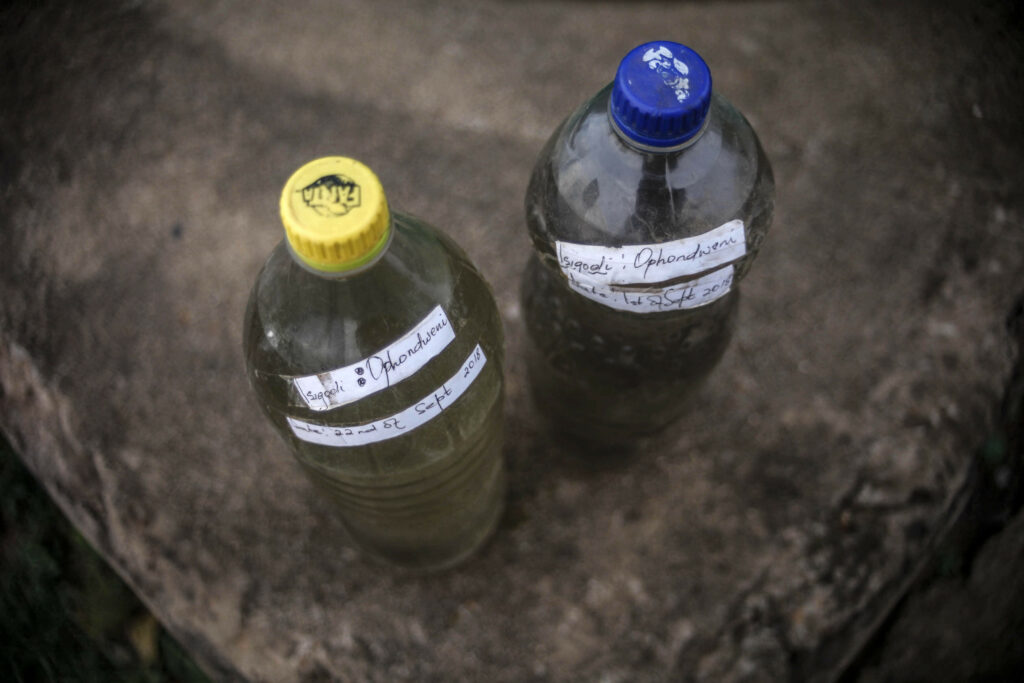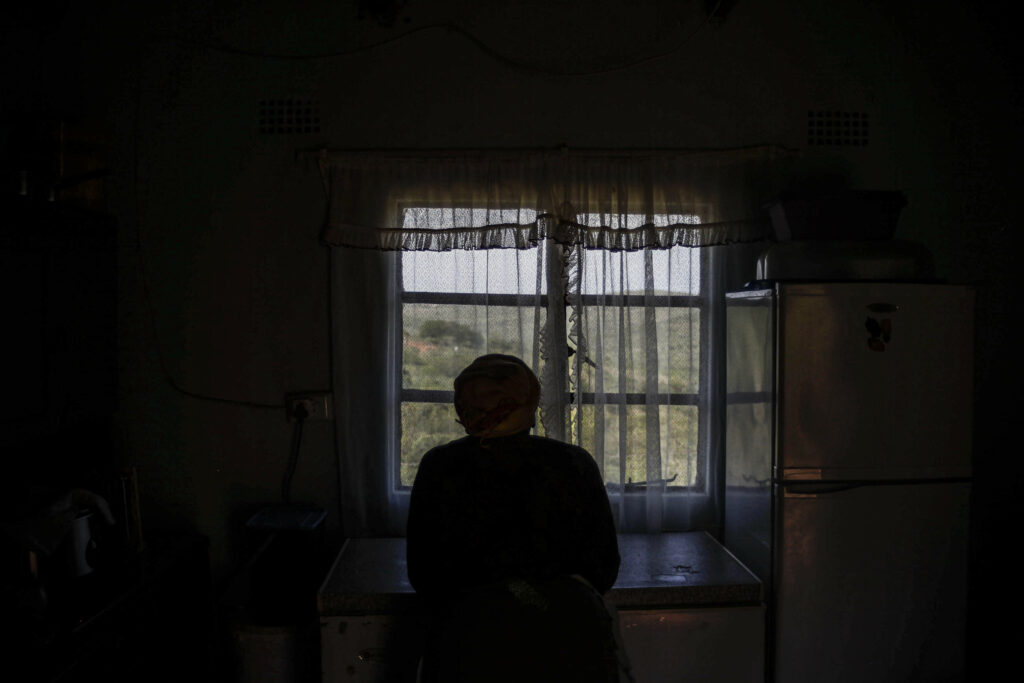Tendele Coal Mine in Somkhele village in Mutabatuba in KwaZulu- Natal has been offering money to residents living around the land that has a coal prospects. (Oupa Nkosi)
An environmental and health hazard is brewing in violence-stricken Ophondweni and Somkhele in KwaZulu-Natal as community members point to the mine for polluting their water and air.
Residents in the two villages have asserted that the environmental cost of Tendele’s Somkhele Coal Mine could be gleaned from the putrid rainwater collected from the gutters and stored in tanks that hold more than 2 000 litres.
These tanks in the village have now become redundant, the community told the Mail & Guardian, because remnants of coal particles have allegedly polluted the air and settled on gutters and pipes that are used to store rainwater.
The M&G’s visit to the villages followed the brutal killing of anti-mining activist, Fikile Ntshangase, who allegedly sustained multiple and fatal gunshot wounds on October 22 for her obstinate opposition to Tendele’s expansion of its coal mining operations.
Ntshangase was the deputy chairperson of the Mfolozi Community Environmental Justice Organisation (Mcejo), which has stubbornly stood against mining expansion to protect the region’s natural landscape.
The alleged pollution caused by the mine is best encapsulated by two two-litre bottles kept by the late Ntshangase, who stored and dated the water on two separate days in September 2018 to show how foul it had become.
When the M&G visited the Ntshangase homestead last week, the matriarch’s family said she had kept the water to show how the age-old practice of storing rainwater in the village had ceased because of the coal mine’s alleged pollution.
Dark, charcoal-like particles visibly float inside the bottles.
One of Ntshangase’s neighbours showed the M&G two idle tanks of 2 200 litres and 2 500 litres, which he no longer uses.
“We live in a water-scarce village, where the taps could go up to two weeks of being dry. The tanks were extremely helpful because we could use the rainwater to drink, do laundry and other household requirements,” said the old man, who asked to remain anonymous.
“But, because the gutters are filthy from the polluted air, we cannot store rainwater any more, unless we want to get sick,” he contended.
Nathi Kunene, Tendele’s community manager, said the mine complied with the [Occupational] Health and Safety Act, and had “third-party monitoring systems” that had monitored ground and surface water since before the mine began operations.
 The environmental damage caused by the Tendele mining operations in and around Ophondweni village includes the mine’s impact on the air, water, soil, visual quality of the environment, and people’s livelihoods, health and wellbeing. This family is no longer able to store rain water in their tanks because of the contamination. (Oupa Nkosi)
The environmental damage caused by the Tendele mining operations in and around Ophondweni village includes the mine’s impact on the air, water, soil, visual quality of the environment, and people’s livelihoods, health and wellbeing. This family is no longer able to store rain water in their tanks because of the contamination. (Oupa Nkosi)
“We also sample and monitor upstream and downstream surface water quality of the Mfolozi River. We have 28 dust buckets around the mine, in which we monitor residential and non-residential dust fall, which is also monitored by third-party specialists, he said.
“All results are evaluated against the [National Environment Management:] Air Quality Act [and the] national dust control regulations. Tendele has been monitoring dust in and around the site since 2008 and has always been compliant in terms of fall-out dust,” Kunene said. He added that “extensive research” had been carried out by Tendele for all future operations.
“Majority specialist studies indicated that the risk before mitigation is medium and the environmental significance after mitigation is low. It is important to note that Tendele has always seen itself as a responsible mining operator and, therefore, ensures that the required legislative obligations are adhered to.
“In this way, one will ensure that the effects of mining are controlled and limited,” Kunene said.
But the old man quoted above said it was after a visit to Ntshangase’s home that he began to realise what he characterised as the dire environmental effects of the mine.
Ntshangase, the old man elaborated, had asked her grandson to fetch the bottles with the dark particles in them. This startled the old man, who went back to his home and checked his rain-storing gutters and pipes and found soot-like substances in them.
“I joined Mcejo after Mrs Ntshangase showed me how badly our water and air was being polluted by the mine. My family survives off subsistence farming, which needs clean water and air.
“If Mrs Ntshangase had not shown me the polluted water, I would probably have been dead by now.”
Another elderly woman, who lives with her daughter and granddaughter, said her livestock, which includes four cows, several goats and chickens, had shrunk significantly since about 2010, four years after the mine began operating.
“I have lost 10 cows over the last 10 years and I believe it’s because of the poor quality of water we are subjected to by the mining,” she said.
Kunene said Tendele had identified subsistence farming as an important factor, and developed projects in its social and labour plans to assist the community.
“This includes training 800 families in basic agricultural farming principles from 2008 to 2012; water-harvesting courses; animal husbandry courses from 2018 to 2020; assisting with equipping boreholes; providing dip tanks for cattle; donating two tractors with implements to the Mtubatuba municipality in 2019 to assist the farmers with their lands or fields; and chicken-broiler production projects being established currently, and assisting with various other smaller agriculture training projects on an ongoing basis,” Kunene said.
 This elderly woman ( who did not want to be identified) has been living on this land since 1960’s with her family in Ophondweni village, Mtubatuba in KwaZulu-Natal. She is now afraid for her life because she does not want to leave it after getting an offer from the Somkhele mine. (Oupa Nkosi)
This elderly woman ( who did not want to be identified) has been living on this land since 1960’s with her family in Ophondweni village, Mtubatuba in KwaZulu-Natal. She is now afraid for her life because she does not want to leave it after getting an offer from the Somkhele mine. (Oupa Nkosi)
Water pollution is not the only issue that some community members have had with the mine over the years. The area has become so hostile that terrified women and children flee their homes every night as fears of being assassinated grip Somkhele .
Last week the M&G reported that there is also an alleged hit list, containing the names of staunch anti-mining activists.
A petrified mother said she was aware that she and her son were on the “kill list” because of their vehement opposition to mining in the region.
The visibly shaken woman, who cried throughout her interview with the M&G, said the string of violent shootings in the area had forced her to rethink her obstinate opposition to the mining expansion.
“It is better for me to leave my home rather than die like Mrs Ntshangase. Had it not been for her death, as well as Mrs [Tholakele] Mthethwa’s attempted murder, I would still be resolute and stay on my land.
“But now I fear for my life, which is in grave danger. Before nightfall, I have to leave with my children and grandchildren and seek refuge at neighbours’ homes because I know that I’m also on the hit list,” the woman said.
“Mrs Ntshangase was killed while living with her grandchild. A hail of bullets flooded Mrs Mthethwa’s home with her two-year-old granddaughter in the house. None of us is safe.”
On Tuesday, The Global Environmental Trust, joined by the Centre for Environmental Rights and Mcejo, appeared in the Supreme Court of Appeal in Bloemfontein to try to overturn the 2018 Pietermaritzburg high court ruling that refused to interdict the expansion of Tendele’s operations, which currently cover more than 22 000 hectares.
Judgment in the appeal has been reserved.